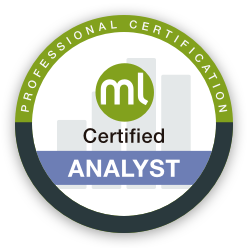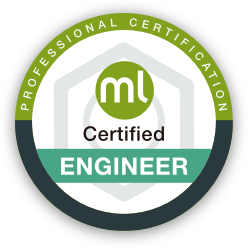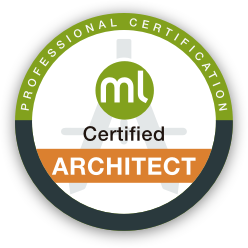BigML Certifications
The breadth of intelligent applications the BigML platform can support spawn many new opportunities for a wide range of professionals that wish to get the most out of their data by getting involved in delivering Machine Learning-based solutions. As such, BigML offers three types of certification programs designed to fit the needs of different professionals: Analysts, Engineers, and Architects. Please see below the differences among the three courses and choose the one that works best for you!

Certified Analyst
This certification course prepares analysts and business professionals to become BigML Certified Analysts. No prior experience in Machine Learning is required to enroll in this course. By joining this program you will learn how to read your data in order to understand when and how to apply Machine Learning to help your organization. You will also learn how to train your own Machine Learning models from scratch and make predictions with them with no code involved, simply using our intuitive Dashboard. The course consists of 6 online classes of 1.5 hours each. Evaluation will be based on solving a set of theoretical questions and exercises presented during the course.
CERTIFICATIONS CALENDAR Modules
Modules
 Objective
Objective
- Understand what Machine Learning is, the many different Machine Learning applications across industries, and what tasks can be performed to solve a given business problem according to the data you have.
- Learn how to train your own Machine Learning models and make predictions with them using the BigML Dashboard.
 Pre-requisites
Pre-requisites
- No prior experience in Machine Learning is required to enroll in this course.
 Timing
Timing
-
The lecturer will be available between 08:00 AM and 08:00 PM PT for live Q&A sessions. Please send an email to education@bigml.com for other time ranges.
 Syllabus
Syllabus
-
Introduction to Machine Learning
-
Machine Learning use cases and real-world applications
-
BigML sources and datasets
-
Supervised learning models: Models, Ensembles, Linear Regressions, Logistic Regressions, Deepnets, Time Series, OptiML, and Fusions
-
Predictions
-
Evaluations: How to properly evaluate a predictive model
-
Unsupervised learning models: Clusters, Anomaly Detectors, Associations, and Topic Models
 Syllabus
Syllabus
-
Data processing for Machine Learning
-
ML-ready data
-
Feature engineering
-
Feature selection
 Syllabus
Syllabus
-
Machine Learning iterations
-
Real Machine Learning solutions requirements
-
1-click automation: Scriptify

Certified Engineer
In order to be eligible to enroll in the BigML Certified Engineer course you must be familiar with general Machine Learning concepts, the BigML Dashboard and its resources. Also, some programming skills are mandatory in this certification, as you will be asked to understand and generate code in Python and the languages available in the platform: Flatline and WhizzML. You can use our documentation and tutorials as a head start: ML 101, Tutorials, API documentation, and WhizzML. This course is ideal for software developers, system integrators, technology consulting, and strategic consulting firms to rapidly get up to speed with Machine Learning and the BigML platform as they acquire and grow their customer base.
CERTIFICATIONS CALENDAR Modules
Modules
 Objective
Objective
- Understand how to parameterize supervised and unsupervised methods to achieve better performance.
- Learn how to compose multiple methods together to better solve modeling problems.
 Pre-requisites
Pre-requisites
- BigML sources and datasets.
- Supervised (Models, Ensembles, Linear Regressions, Logistic Regressions, Deepnets, Time Series, and OptiML) and Unsupervised (Cluster Analysis, Anomaly Detection, Association Discovery, and Topic Modeling) methods.
- 1-click Model, 1-click Ensemble, 1-click Linear Regression, 1-click Logistic Regression, 1-click Deepnet, 1-click Time Series, 1-click OptiML, 1-click Cluster, 1-click Anomaly, 1-click Association, 1-click Topic Model.
- Simple evaluations and metrics.
 Syllabus
Syllabus
-
Modeling vs. Prediction
-
Supervised Learning
Decision Trees: Node threshold, Weights, Statistical Pruning, Modeling Missing Values.
Ensemble Classifiers: Bagging (Sample Rates, Number of Models), Random Decision Forests (Random Candidates), Boosting.
Linear Regression: Field Encodings.
Logistic Regression: L1 Normalization, L2 Normalization, Field Encodings, Scales.
Deepnets: Topologies, Gradient Descent Algorithms, Automatic Network Discovery.
Time Series: Error, Trend, Damped, Seasonality.
Evaluation: How to Properly Evaluate a Predictive Model, Cross-Validation, ROC Spaces and Curves.
OptiML: How to optimize the process for model selection and parametrization to automatically find the best model for a given dataset.
Fusion: Combination of models, ensembles, linear regressions, logistic regressions, and deepnets to balance out the individual weaknesses of single models.
-
Unsupervised Learning
Clustering: Number of Clusters, Dealing with Missing Values, Modeling Clusters, Scaling Fields, Weights, Summary Fields, K-means vs. G-means.
Association Discovery: Measures (Support, Confidence, Leverage, Significance Level, Lift), Search Strategies (Confidence, Coverage, Leverage, Lift, Support), Missing Items, Discretization.
Topic Modeling: Topics, Terms, Text analysis.
Anomaly Detection: Forest Size, Constraints, ID Fields.
-
Combination and Automation
Stacking.
 Timing
Timing
-
The lecturer will be available between 08:00 AM and 08:00 PM PT. Please send an email to education@bigml.com for other time ranges.
 Objective
Objective
- Proficiency in using BigML's API and client-side tools to create ML resources.
- Integration and automation of the workflows needed put a ML solution in production.
 Pre-requisites
Pre-requisites
- Basic knowledge of BigML and its resources (UI-level familiarity is enough).
- Basic programming skills (some examples are in Python, so knowledge of the language will be a plus).
- Familiarity with REST APIs.
 Syllabus
Syllabus
-
API description
Domains (bigml.io vs. Private Deployments).
Authentication.
Inputs and outputs.
Resources: Common information, Specifics, Listing and filtering.
-
First level wrappers
Bindings.
Methods mapping.
Field management.
Local resources.
-
Second level wrappers
BigMLer.
Resource management.
Field management.
Workflow automation.
Automated feature engineering.
-
Modeling strategies
-
Predicting strategies
 Timing
Timing
-
The lecturer will be available between 01:00 AM and 01:00 PM PT. Please send an email to education@bigml.com for other time ranges.
 Objective
Objective
- Data is typically: scattered, unclean, and imperfect. How to make it ML-Ready.
- Once data is ML-Ready, why/how to make better features.
- Not all features are good. How to choose and what to watch out for.
 Pre-requisites
Pre-requisites
- Advanced Modeling Class.
- Familiarity with: SQL, Python / Pandas, CSV formatting.
 Syllabus
Syllabus
-
ML-Ready Data
What is it?
Formats.
Structures for ML tasks.
Automating Labeling.
-
Data Transformations
Cleansing Missing Data, Cleaning Data, Better Data.
Transformations outside and inside BigML: SQL-style queries, Denormalizing, Aggregating, Pivoting, Time windows, Updates, Streaming Data, Images.
Principal Component Analysis (PCA): Dataset transformation and dimensionality reduction.
-
Feature Engineering
Auto Transformations: Date-time parsing, LR/cluster missing, LR/cluster auto-scaling, Bag-of-words (Language, Tokenization, etc).
Manual - Flatline: DSL for feature engineering, Basics (s-expressions/formulas, Literals, Counters, Field Values / Properties, Strings, Regex, Operators), Limitations.
Numerics: Discretization, Normalization, Z-score, Built-in math functions, Type-casting, Random, Shocks, Moving averages.
Date-times: UI timestamp, Epoch, Moon phase.
Text: JSON key/val, Topic distributions.
-
Feature Selection
Correlations.
Leakage.
Field Importance (ensembles).
Advanced Selection: Best-First, Boruta.
 Timing
Timing
-
The lecturer will be available between 10:00 AM and 10:00 PM PT. Please send an email to education@bigml.com for other time ranges.
 Objective
Objective
- Proficiency in using BigML's DSL language, WhizzML, as a server-side tool to automate ML-workflows in a scalable, replicable and shareable way.
 Pre-requisites
Pre-requisites
- Basic knowledge of BigML and its resources (UI-level familiarity is enough).
- Familiarity with ML-workflows.
- Basic programming skills (knowledge of some language of the LISP-family and/or WhizzML will be a plus).
 Syllabus
Syllabus
-
WhizzML directives
-
Directives mappings
-
Simple workflows in WhizzML
Batch Anomaly Score.
Evaluation.
Clustered dataset generation.
-
Advanced workflows in WhizzML
Cross-validation.
Covariate shift.
Stacked generalization.
 Timing
Timing
-
The lecturer will be available between 03:00 PM and 09:00 PM PT. Please send an email to education@bigml.com for other time ranges.

Certified Architect
Once you have successfully passed the BigML Certified Engineer course, you are eligible to enroll in the BigML Certified Architect course. By becoming a Certified Architect in BigML you will be able to structure an end-to-end Machine Learning project with the global vision needed to connect all the pieces of the Machine Learning application together for the project to work smoothly. The course has been designed to be partly hands-on. Your evaluation questions will include simplified versions of real end-to-end Machine Learning applications in different production scenarios (online, batch, event-driven) using different programming languages and tools (Javascript, Python, GitHub, Docker, etc.). Mastering these tools is not the goal or a prerequisite of the course, and commented examples are provided so that you can learn about the coding particulars that need to be used in your answers. Nevertheless, being familiar with them is recommended.
CERTIFICATIONS CALENDAR Modules
Modules
 Objective
Objective
- Get ready to design and build robust Machine Learning-based applications that operate in real-world environments.
 Pre-requisites
Pre-requisites
- You need to pass the BigML Certified Engineer course in order to enroll in the BigML Certified Architect course.
 Timing
Timing
-
The lecturers will be available for live Q&A sessions when needed. Please send an email to education@bigml.com to schedule your meeting.
 Syllabus
Syllabus
-
Real-world Machine Learning
-
Building end-to-end Machine Learning applications
-
How to size and address your project
Premature optimization is the root of all evil in Machine Learning as well.
Automating the automatable.
 Syllabus
Syllabus
-
Models complexity
-
Memory requirements
-
Predictions time lapse
-
Combined models as a new model
 Syllabus
Syllabus
-
Immediately actionable models: The Dashboard
-
Local or remote
-
Model export and packaging: Up or Down
-
Models called from third part applications: Zapier
-
Models embedded in third part applications
 Syllabus
Syllabus
-
Single model, time-sensitive predictions
-
Local memory management
-
Predict Server
 Syllabus
Syllabus
-
Multiple models, batch predictions
-
Retraining and monitoring workflows
-
Client versus server complexity
 Syllabus
Syllabus
-
BigML Node-RED
 Syllabus
Syllabus
-
Tailored ML apps
-
Acquiring and defining the data entities
-
Storing modeling workflows
 Syllabus
Syllabus
-
Data shift monitoring
-
Retraining and monitoring workflows

